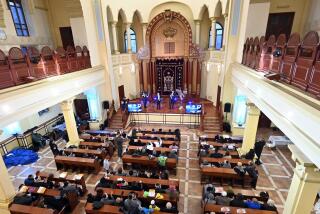Daughter Returning to Germany to Sing Praises of Judaism
- Share via
A South County cantor is traveling this weekend to the German town where her late father was rabbi to sing at a ceremony in his honor.
In a far cry from the day 60 years ago when her father escaped the Nazi regime with the help of a sympathetic SS chief, Shula Kalir-Merton will offer liturgical music and contemporary Israeli songs Tuesday at an exhibit commemorating 300 years of Jewish history in the region. Kalir-Merton is singing, and opening a discussion with area residents, at the closing ceremony for the exhibit, which was mounted by a Christian group called the Evangelical City Academy of Bochum.
“I’m going there with mixed feelings because of the painful history there,” she said, “but I’m going with a feeling of pride to honor the memory of my father.”
Among the more painful parts will be a side trip to the concentration camp where her father was imprisoned.
Singing the melodies of her heritage comes naturally to Kalir-Merton, for 10 years the cantor at Temple Beth El in Aliso Viejo. A cantor leads the congregation in Hebrew prayers, most of which are sung rather than recited.
*
One of the honorees of both the exhibit and closing ceremony is Kalir-Merton’s father, Rabbi Joseph Kalir, the last rabbi in Bochum, Germany. His synagogue was destroyed in November 1938 during Kristallnacht, or “night of the broken glass,” in which the SS--the Schutzstaffel, or special police--and Nazi mobs attacked Jewish homes, businesses and synagogues and arrested many Jews. Kristallnacht is considered the beginning of the overt persecution of the Jewish people under Nazism.
Now, Kalir-Merton said, only a handful of Jews remain in the town, not enough to form a congregation.
Rabbi Kalir’s first congregation after he graduated from rabbinical school was in Bochum, his daughter said. He served there for about three years as Nazi influence grew throughout Germany, publicly advocating Zionism after the Nazis had prohibited such activity.
Knowing that Kristallnacht was about to occur, a neighbor who was the local head of the SS advised the rabbi to take a vacation without telling him why. But when Kalir heard about the night of terror during his trip to Berlin, he returned to his congregation and his town, where he was captured and sent to a concentration camp.
*
After he was imprisoned, Kalir’s wife pleaded for her husband’s release before the head of the SS in Bochum every day for three months. One day she became too ill to plead on his behalf, and the next day Kalir’s name was announced after the 4 p.m. roll call at the concentration camp. This usually meant the person was to be executed in front of a firing squad. Instead, Rabbi Kalir was given a telegram commanding him to report to the head of the SS of Bochum. Once again, the neighbor had intervened to save him. Recent efforts to locate the man have been unsuccessful, Kalir-Merton said.
The rabbi and his wife gathered their belongings and fled to Israel, where they remained for 16 years and where their daughter was born. There, Kalir taught high school and wrote two books about the Jewish people.
Eventually, the family settled in the United States, where Kalir wrote several textbooks on the principles of Judaism and became chairman of the Religious Studies Department at Cal State Fullerton. He died in 1988.
*
During a trip to Israel two years ago, Kalir-Merton met a tour guide from the same German town as her parents. The tour guide owned a book about Jewish history that mentioned Rabbi Kalir and that contained a footnote giving his Gestapo file number.
The information came in handy last summer, when researchers at the Evangelical City Academy of Bochum contacted Kalir-Merton through the Internet, inviting her to speak. The researchers went to the Dusseldorf city hall archives and located his file, which contained a transcript of a speech he had given on Zionism, word for word, as recorded by an undercover SS agent.
“This could be the one that got him in trouble” with the Nazis, Kalir-Merton said. Now, 60 years later, it is one of his badges of honor.
More to Read
Sign up for Essential California
The most important California stories and recommendations in your inbox every morning.
You may occasionally receive promotional content from the Los Angeles Times.













